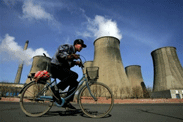 Carbon markets essentially, put a price on carbon, which is seen as a possible key weapon against climate change. Consequently, carbon trade – allows those companies that have already cut emissions under a set limit, to sell credits representing the reductions to slower-moving players. This is seen as an efficient way to stimulate clean technologies with the intention of slowing and then decreasing global emissions.
Carbon markets essentially, put a price on carbon, which is seen as a possible key weapon against climate change. Consequently, carbon trade – allows those companies that have already cut emissions under a set limit, to sell credits representing the reductions to slower-moving players. This is seen as an efficient way to stimulate clean technologies with the intention of slowing and then decreasing global emissions.
Mainland China’s biggest producer of oil – PetroChina Co. Ltd. (PTR), announced today the initiation of China’s largest carbon trade.
“The co’s first clean development mechanism project — a nitrous oxide decomposition project by Liaoyang Petrochemical Company, according to chinacsr – has been approved by the United Nations CDM Executive Board”.
The UN CDM Board gave PetroChina the ok to trade its carbon indicators equaling a little less than 1 million tons.
The Clean Development Mechanism [CDM] is an arrangement which allows industrialised countries to invest in projects that reduce emissions limits by investing in clean projects in developing countries.
“The Petrochemical Co. has a capacity of 140,000 tons of oxalic acid, with nitrous oxide emission of over 40,000 tons each year whose greenhouse effect is 310 times greater than carbon dioxide. Once emission reduction devices will be put into use, the NO2 will be transformed into oxygen and nitrogen.”
Canadian NAM and Goldman Sachs (GS) are amongst the buyers of carbon credits obtained through this CDM project.
In 2007 Asia & Pacific accounted for 80% of carbon trade volume in the CDM market. New projects in Asia have increased dramatically with China accounting for 51% of the world’s CDM carbon emission credits.
- Bulenox: Get 45% to 91% OFF ... Use Discount Code: UNO
- Risk Our Money Not Yours | Get 50% to 90% OFF ... Use Discount Code: MMBVBKSM
Disclaimer: This page contains affiliate links. If you choose to make a purchase after clicking a link, we may receive a commission at no additional cost to you. Thank you for your support!


Leave a Reply